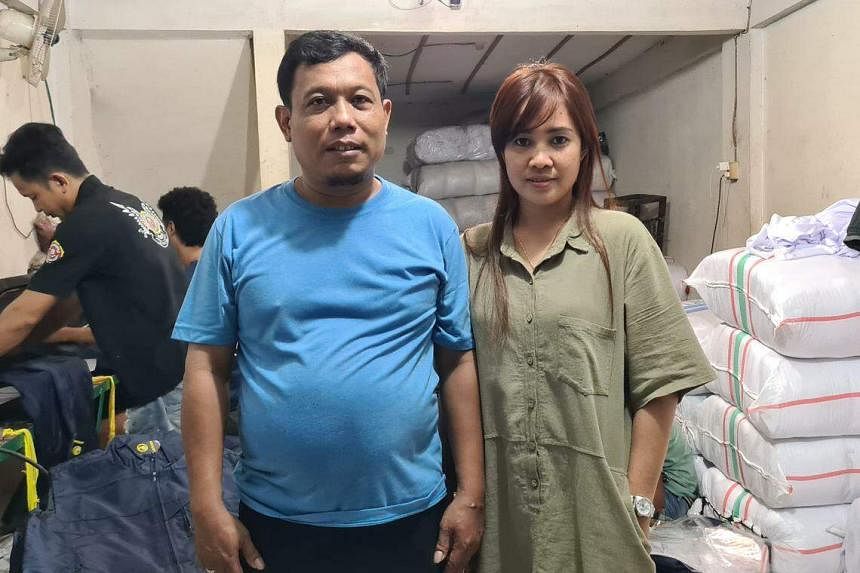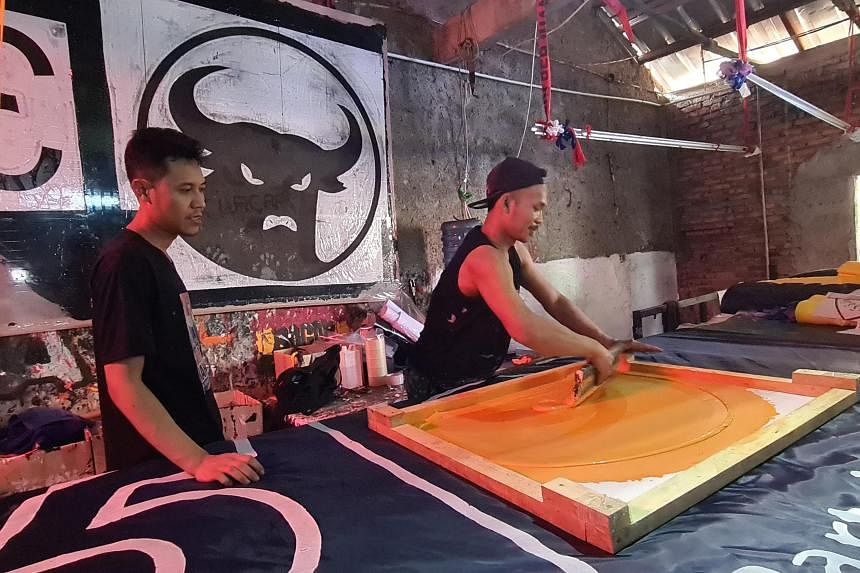JAKARTA – On the second floor of a house in South Jakarta, a worker is busy applying yellow screen-printing ink on a 6 sq m blue flag as big as two queen-size mattresses.
His two colleagues then help him to lift and fold the cloth bearing the name and logo of the NasDem Party, before hanging it for drying.
In another workshop in a nearby home, two workers are printing smaller party flags with a press machine, while four other men are sewing the flags and packing items for delivery.
As the campaign season for Indonesia’s February 2024 elections gets under way, such small home-based businesses are inundated with orders of flags, banners, T-shirts and other items from the 18 political parties in the race.
On Feb 14, Indonesians will vote for their next president and vice-president, as well as legislators at national and regional levels, in what is said to be the world’s biggest single-day election. Some 204.4 million people are eligible to vote.
Business owner Sakun Nurwanto, helped by 20 employees, is making around 3,000 flags of different sizes from 8am to midnight daily.
The smallest flag of 54 sq cm is sold at 5,000 rupiah (43 Singapore cents), while the biggest one – like the blue flag – is sold at 55,000 rupiah.
One of the challenges in his business, which makes flags for mass organisations on normal days, is to ensure the names of the candidates are spelt correctly.
“If we lack only one letter, we must replace the erroneous flags with new ones. The old ones are totally useless,” the 55-year-old father of two told The Straits Times.
Another major challenge is dealing with customers. “Fraud is common. Customers may place big orders, but don’t pay,” he said.
Such challenges may bring significant losses to Mr Sakun’s business, which was set up in 1999. That year, Indonesia held its first free and democratic elections after the fall of strongman Suharto in May 1998.
Forty-eight political parties joined the elections, a major leap from only three parties in the elections held between 1982 and 1997.
But Mr Sakun’s business got its record order of one million flags only in the 2019 elections from Berkarya Party, founded by Mr Suharto’s youngest son Hutomo Mandala Putra in 2016. He lost control of the party in 2020 due to internal woes.
There is no official figure on the current value of the election paraphernalia business in the world’s third-largest democracy.
Gerindra Party deputy chairman Habiburokhman said that for the 2019 elections, he spent up to 2 billion rupiah, part of which was used to buy items such as T-shirts, when he was contesting to become a legislator, national newspaper Kompas reported.
In the coming elections, nearly 10,000 candidates are competing for 580 seats in Parliament, while hundreds of thousands more are contesting nearly 20,000 seats at the regional level.
Businesses producing election flags and T-shirts are doing well, thanks to their widespread use.
Business owner Aji Ngajiman told ST that in the 2014 and 2019 elections, his apparel sales hit 100 billion rupiah. He secured an all-time high order of two million T-shirts in 2014.
He hopes to hit a similar sales value during this campaign season.

The 44-year-old father of two, who set up his business in 2005, expects to expand to the full production capacity of 50,000 T-shirts daily after sealing orders of up to one million T-shirts recently.
In the past, Mr Aji could earn a net profit of 25 million rupiah each day when his four production facilities ran at full throttle. This is nearly double of what he earns in a month during the non-election period, when his business sells up to 30,000 pieces of apparel.
Starting three months ago, his production facilities and 70 workers have been making T-shirts and vests for political parties and election candidates. On most days, his employees, who work in two 12-hour shifts, produce 20,000 T-shirts.
To stay in the business, which has been seeing more new players, Mr Aji uses only fabric that is of “the best quality”.
“The competition in this business is very tough. People can shift to another producer for a price gap of as low as 200 to 300 rupiah,” he said.
“If people can’t accept the price I offer, they’d better find other producers. I will not compromise my quality.”
Mr Aji considers this campaign season a “good momentum” to help his business recover from the Covid-19 pandemic, during which monthly orders for T-shirts and uniforms from his corporate clients dropped by 70 per cent.
Unlike Mr Sakun and Mr Aji, there are some who have not seen a boost in business.
Mr Wahyu Alamsyah, a manager at a shop offering party paraphernalia from jackets to hats in Pasar Senen in Central Jakarta, said that it has yet to receive orders for campaign giveaways.
“The short campaign period likely affects sales,” he told ST, referring to the 75-day period, which ends on Feb 10.
“Political parties and candidates are also intensifying their campaign on social media and reducing spending on souvenirs.”
Dr Kunto Adi Wibowo, a political communications expert from Padjadjaran University, acknowledged that social media campaigns are among the factors behind the decline in the sales of certain campaign giveaways. However, he also noted that legislative candidates have become more selective in their spending amid surging living costs, especially rising food prices.
Their campaign costs are higher and “that’s why they must prioritise”, he said.
He noted that T-shirts are more popular among male constituents, while female voters prefer veils and staple food, such as cooking oil.
While the giveaways may not affect the choice of voters, they can help constituents know who their candidates are, said Dr Kunto.
Mr Aji said: “People can wear the T-shirts during a campaign rally... and they can still be useful after that. In villages, people can wear them when they work in rice fields, attend wedding parties, or hang out.”


